外延新标准九年级上英语Module1 时态复习
九年级外研版第一板块语法讲解
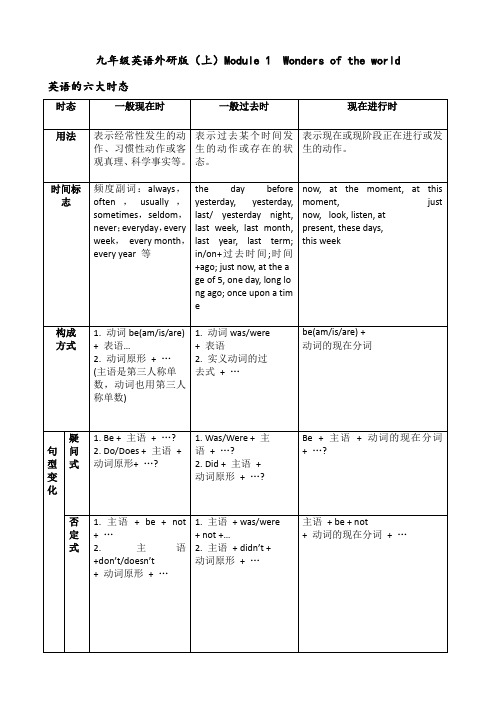
九年级英语外研版(上)Module 1 Wonders of the world 英语的六大时态提升训练:1、Jenny ____ in an office.Her parents ____in a hospital.A work; worksB works; workC work; are workingD is working; work2、One of the boys_____ a black hat.A haveB there isC there areD has3 、We will go shopping if it____ tomorrow.A don't rainB didn't rainC doesn't rainD isn't rain4 、He said the sun ____in the east and ____in the west.A rose; setB rises; setsC rises, setD rise; sets5 、Wang Mei ____ music and often ____ to music.A like; listenB likes; listensC like; are listeningD liking ; listen6、Look! He _____their mother do the housework.A. is helpingB. are helpC. is helpD.is helpping7 、_____are the boys doing ? They are singing in the room.A .WhoB .How C.What D.Where8、Don’t talk here. My mother _____.A. is sleeping B .are sleeping C. sleeping D .sleep9 、Danny ______. Don’t call him.A. is writeing B .is writing C.writing D .writes10 、–----- When_____he_____back? –------ Sorry, I don’t know.A. does,comeB.are comingC.is comeD.is coming11、She lived there before he____to China.A. cameB. comesC. comeD. coming12、I _____but_____nothing.A . was listened;was hearing B. listened;heard C . have listened; heard D. listened; heard of13、When did you ____here?A. got toB. reachedC. arrive inD. reach14、I____my homework at 7:00 yesterday evening.A. finishedB. would finishC. was finishingD. finish15、------He didn't go shopping with you yesterday afternoon, did he?- -----A. No, he doesn'tB. Yes, he didn'tC. No, he didD. Yes, he did.16、_____you ____a doctor when you grow up?A Will; going to beB Are; going to beC Are; /D Will; be17、I don’t know if his uncle _____.I think he _____ if it doesn’t rain.A will come; comesB will come; will comeC comes; comesD comes; will come18、He will be back _____a few minutes.A withB forC onD in19、What time _____we meet at the gate tomorrow?A willB shallC doD are20、He will have a holiday as soon as he _____the work next week.A finishesB doesn’t finishC will finishD won’t finish21、What ______ from three to four yesterday afternoon?A have you doneB had you doneC did you doD were you doing22、-– I call you yesterday evening, but there was no answer.--- Oh., I’m sorry I _____ dinner at my friend’s home.A homeB hadC was havingD have had23、My mother _____ while my father _____TV.A cooked; was watchingB was cooking; was watchingC was cooked; watchedD cooked; watched24、When I got home, my son _____ the music.A am listening toB listened toC was listening toD was listening25、We heard a cry when we ______ TV last night.A were watchingB would watchC watchD watched。
外研版-英语-九上Module1:要点解析学案
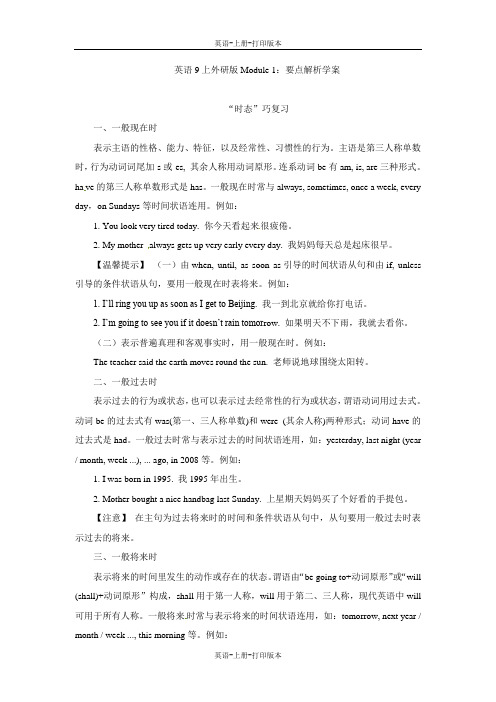
英语9上外研版Module 1:要点解析学案“时态”巧复习一、一般现在时表示主语的性格、能力、特征,以及经常性、习惯性的行为。
主语是第三人称单数时,行为动词词尾加-s或-es, 其余人称用动词原形。
连系动词be有am, is, are三种形式。
ha ve的第三人称单数形式是has。
一般现在时常与always, sometimes, once a week, every day,on Sundays等时间状语连用。
例如:1. You look very tired today. 你今天看起来很疲倦。
2. My mother always gets up very early every day. 我妈妈每天总是起床很早。
【温馨提示】(一)由when, until, as soon as引导的时间状语从句和由if, unless 引导的条件状语从句,要用一般现在时表将来。
例如:1. I’ll ring you up as soon as I get to Beijing. 我一到北京就给你打电话。
2. I’m going to see you if it doesn’t rain tomor row. 如果明天不下雨,我就去看你。
(二)表示普遍真理和客观事实时,用一般现在时。
例如:The teacher said the earth moves round the sun. 老师说地球围绕太阳转。
二、一般过去时表示过去的行为或状态,也可以表示过去经常性的行为或状态,谓语动词用过去式。
动词be的过去式有was(第一、三人称单数)和were (其余人称)两种形式;动词have的过去式是had。
一般过去时常与表示过去的时间状语连用,如:yesterday, last night (year / month, week ...), ... ago, in 2008等。
例如:1. I was born in 1995. 我1995年出生。
外研版英语九年级上册Module1 六大时态用法专练
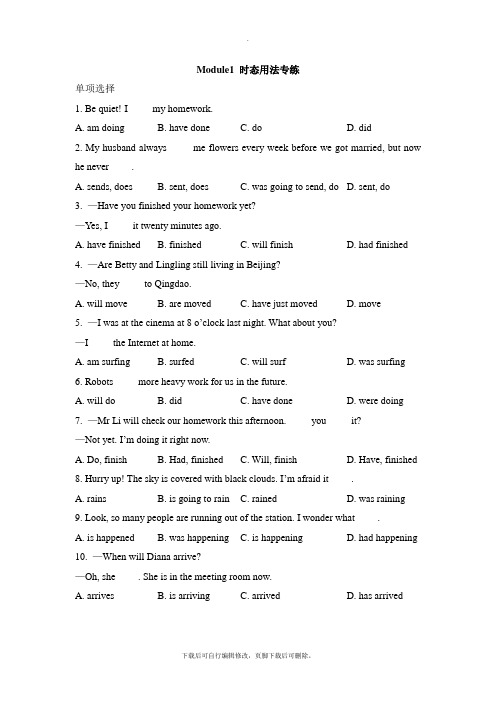
Module1 时态用法专练单项选择1. Be quiet! I ____ my homework.A. am doingB. have doneC. doD. did2. My husband always ____ me flowers every week before we got married, but now he never ____.A. sends, doesB. sent, doesC. was going to send, doD. sent, do3. —Have you finished your homework yet?—Yes, I ____ it twenty minutes ago.A. have finishedB. finishedC. will finishD. had finished4. —Are Betty and Lingling still living in Beijing?—No, they ____ to Qingdao.A. will moveB. are movedC. have just movedD. move5. —I was at the cinema at 8 o’clock last night. What about you?—I ____ the Internet at home.A. am surfingB. surfedC. will surfD. was surfing6. Robots ____ more heavy work for us in the future.A. will doB. didC. have doneD. were doing7. —Mr Li will check our homework this afternoon. ____ you ____ it?—Not yet. I’m doing it right now.A. Do, finishB. Had, finishedC. Will, finishD. Have, finished8. Hurry up! The sky is covered with black clouds. I’m afraid it ____.A. rainsB. is going to rainC. rainedD. was raining9. Look, so many people are running out of the station. I wonder what ____.A. is happenedB. was happeningC. is happeningD. had happening10. —When will Diana arrive?—Oh, she ____. She is in the meeting room now.A. arrivesB. is arrivingC. arrivedD. has arrived参考答案及解析1.A 由Be quiet!确定用现在进展时,应选A。
外研版-英语-九年级上册-外研版九上英语:Module1 3单元 参考课件
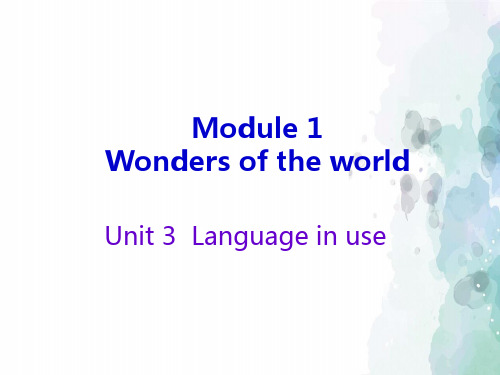
Unit 3 Language in use
语法聚焦
英语六大基本时态
1.一般现在时
定义
(常涉及现在):表示现在经常反复发生 的或习惯性的动作或状态;还可用来描述 真理
谓语构成 am/is/are,do/does
时间状语
always, usually, often, sometimes, seldom, hardly, never,every year, once a day,twice a week,three times a month,on Sundays等
课堂练习
一、用所给单词的适当形式填空 1. Her uncle ____h_a_s__t_a_u_g_h_t___ (teach) in this school since 2002. 2. His mother ___g_o_t____ (get) up at six o’clock and made breakfast for him. 3. Look ! Mike ____i_s__f_l_y_i_n_g____ (fly) kites with David. 4. My father isn ’t at home. He ___h_a_s__g_o_n_e___ (go) to work. 5. Betty will go shopping with me if it __d_o_e_s_n_’__t__r_a_i_n__ (not rain) tomorrow.
4.过去进行时
定义
定义(常涉及过去某一时刻):表示过去 某个时间点或过去某时间段正在进行的 动作
谓语构成 was/were doing
外研(新标准)版九年级上Module1-3复习课件
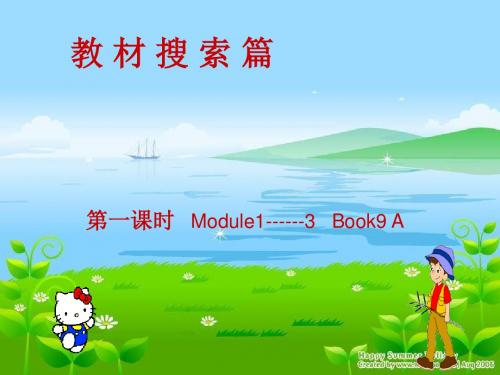
affect effect influence 作为动词, 都含“影响”的意思。 affect 指“产生的影响之大足以引起反应”,着重“影响” 的动作, 有时含有“对...产生不利影响”的意思, 如: This article will affect my thinking. 这篇文章将会影响我的思想。 effect 指“实现”、“达成”,着重“造成”一种特殊的效 果, 如: This book effected a change in my opinion. 这本书使我的看法起了变化。 influence 指“通过说服、举例等对行动、思想、性格等产 生不易觉察到的,潜移默化的影响”, 如: Influenced by a high-school biology teacher, he took up the study of medicine. 在一位中学生物教师的影响下, 他从事医学研究。
网站版权所有
1、stand for表示,代表: stands for “yen”¥代表日元 What does UFO stand for? It stands for Unidentified Flying Objects. 2、represent(基本义为使用他物以表达或代表某物) ①表示,象征。The dove represents peace. 鸽子象征 和平。 ②代表/理 He represents our class.他代表我们班级。 He represented the principal at the ceremony. 他在典 礼上代理校长。 都是代表的意思,但有区别。 represent是象征,表抽象;代表某一些人 请看以下例句 These stones represent armies. 那些石头代表部队
外研版九年级上册英语语法总结
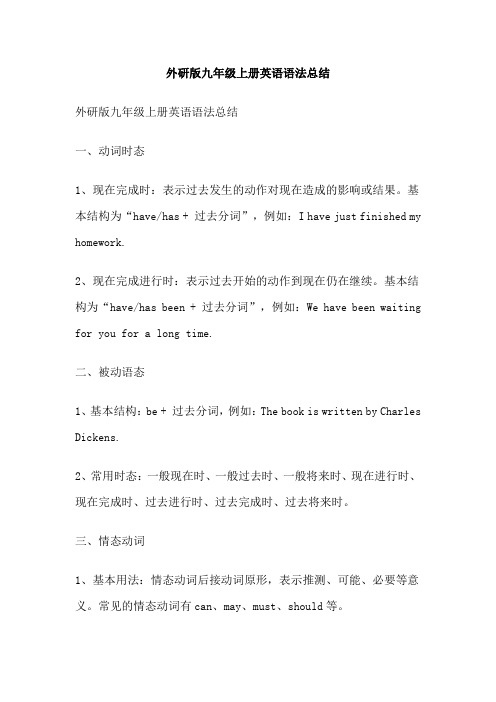
外研版九年级上册英语语法总结外研版九年级上册英语语法总结一、动词时态1、现在完成时:表示过去发生的动作对现在造成的影响或结果。
基本结构为“have/has + 过去分词”,例如:I have just finished my homework.2、现在完成进行时:表示过去开始的动作到现在仍在继续。
基本结构为“have/has been + 过去分词”,例如:We have been waiting for you for a long time.二、被动语态1、基本结构:be + 过去分词,例如:The book is written by Charles Dickens.2、常用时态:一般现在时、一般过去时、一般将来时、现在进行时、现在完成时、过去进行时、过去完成时、过去将来时。
三、情态动词1、基本用法:情态动词后接动词原形,表示推测、可能、必要等意义。
常见的情态动词有can、may、must、should等。
2、特殊用法:情态动词后接“have + 过去分词”,表示推测、可能、必要等意义。
例如:You must have misunderstood me.四、定语从句1、基本用法:在句子中,定语从句用来修饰主语、宾语或表语。
引导定语从句的有that、which、who等。
2、难点解析:如何判断定语从句的引导词,根据定语从句与先行词的关系以及定语从句在句子中的作用来决定。
五、状语从句1、时间状语从句:用来表达动作发生的时间,例如:When the sun sets,we will go home.2、条件状语从句:用来表达某个条件下的结果,例如:If it rains tomorrow,we will stay at home.3、原因状语从句:用来表达原因或理由,例如:Because he was late,he missed the train.六、名词性从句1、主语从句:在句子中作主语,例如:What they need is more time.2、宾语从句:在句子中作宾语,例如:He told me that he would comeback soon.3、表语从句:在句子中作表语,例如:The reason why he left is unclear.以上是外研版九年级上册英语语法的主要内容,同学们在学习过程中要注意理解语法规则的基本含义和用法,多加练习,提高自己的英语语言能力。
Module 1 Unit 1 外研版英语九年级上册知识点详解
外研版英语九(上)Module 1 Wonders of the world知识点详解Unit 1What is a wonder of the world?★(A3).【知识点再现】Let’s call Wonder of the World and join in the discussion. 我们给《世界奇观》节目打电话,加入讨论吧。
【知识点1】wonder可作动词或名词,其用法如下:①wonder作名词,意为“奇迹;奇观”时,是可数名词,其复数形式为wonders。
如:We have visited many wonders of the world. 我们已经参观了许多世界奇观。
The Great Wall is one of the seven wonders of the world. 长城是世界上七大奇迹之一。
②wonder作名词,意为“惊叹;惊奇”时,是不可数名词。
常用的句型有:It’s a wonder that...令人惊奇的是……;It’s no wonder that... 难怪……。
如:It’s no wonder that he is late. 难怪他迟到了。
It’s a wonder (that) more people weren’t hurt. 奇怪的是没有更多的人受到伤害。
③wonder作动词,意为“想知道”,相当于want to know,后面接who, what, why, where, if或that等引导的宾语从句或“疑问词+不定式”构成的短语。
如:I wonder who she is. 我想知道她是谁。
She wondered what the child was doing. 她感到疑惑,孩子究竟在干什么。
I wonder why Ann is late. 我想知道安为什么迟到了。
I wonder (that) she has won the race. 我对她赢了比赛感到惊讶。
Module-1-Unit-1-外研版英语九年级上册知识点详解
外研版英语九(上)Module 1 Wonders of the world知识点详解Unit 1What is a wonder of the world?★(A3).【知识点再现】Let’s call Wonder of the World and join in the discussion. 我们给《世界奇观》节目打电话,加入讨论吧。
【知识点1】wonder可作动词或名词,其用法如下:①wonder作名词,意为“奇迹;奇观”时,是可数名词,其复数形式为wonders。
如:We have visited many wonders of the world. 我们已经参观了许多世界奇观。
The Great Wall is one of the seven wonders of the world. 长城是世界上七大奇迹之一。
②wonder作名词,意为“惊叹;惊奇”时,是不可数名词。
常用的句型有:It’s a wonder that...令人惊奇的是……;It’s no wonder that... 难怪……。
如:It’s no wonder that he is late. 难怪他迟到了。
It’s a wonder (that) more people weren’t hurt. 奇怪的是没有更多的人受到伤害。
③wonder作动词,意为“想知道”,相当于 want to know,后面接who, what, why, where, if或that 等引导的宾语从句或“疑问词+不定式”构成的短语。
如:I wonder who she is. 我想知道她是谁。
She wondered what the child was doing. 她感到疑惑,孩子究竟在干什么。
I wonder why Ann is late. 我想知道安为什么迟到了。
I wonder (that) she has won the race. 我对她赢了比赛感到惊讶。
Module 1 语法: 六种时态讲解课件 2021-2022学年外研版英语九年级上册
A. cleans
B. cleaned
C. is cleaned
D. was cleaned
2. I don’t know when he __________ back. Please tell me when he __________ back.
A. comes; comes
B. comes; will come
的时间状语连用。
3
基本结构:动词的过去式
一般过去时
主要用法:
1.表示过去发生的动作或存在的状态 【例】We had a picnic last weekend。
3. 用于虚拟语气中,表示 与现在事实相反的情况。
2. 表示过去经常发生的 【例】 I never came to school last
Module 1 语法讲解
六种基本时态讲解
1
一般进行时
目录
DIRECTORY
3
一般过去时
4
现在进行时
6
现在完成时
1
一般现在时
主要用法:
基本概念
表示现阶段经常发生的动作或者状态
表示主语具备的喜好、 性格和能力等。
【例】 You are shy. 你好害羞
描述客观真理、客观存在 或科学事实等。
一般现在时& 一般过去时对比练习
【例题】
D 4.—Are you going anywhere? —I _______ about visiting my sister,but I have changed my mind.
A.think
B .have thought
C.will think
D.thought
外研版九年级英语(WY)上册精品课件 Module 1 模块语法聚焦1
B.have had
• C.bought
D.buy
• ( )8.(河北中考)It _______ dark.Shall I turn on the
ligCht? • A.gets
B.got
• C.is getting
D.was getting
• A.drew
B.will draw
• C.has drawn
D.was drawing
• ( )6.—Did Billy and Anna find a way out at last? • B —Yes,they _______a plan and did it.
• A.were working out B.worked out
• —Really.We need to have a good rest.
• Ⅱ.单项选择。
• D ( )1.This museum _______here for over 80 years.It _______one of the oldest buildings in this city.
Module 1
Wonders of the world
模块语法聚焦
语法专讲 语法专练
语法专讲
• 六种常用时态 • 1.一般现在时可表示:经常发生或习惯性的动作或状态; 现在的状况、能力和性格特征;客观真理、客观存在或科学
事实等。 • What do you often do on Sundays?你周日经常做什么? • 【注意】在when,until,if,as soon as等引导 的状语从 句中,如果主句是一般将来时,从句要用一般现在时表示将
• 4.Salololyks________(look) happy.Perhhaaspksnoswhen ____________(know) the good news.
